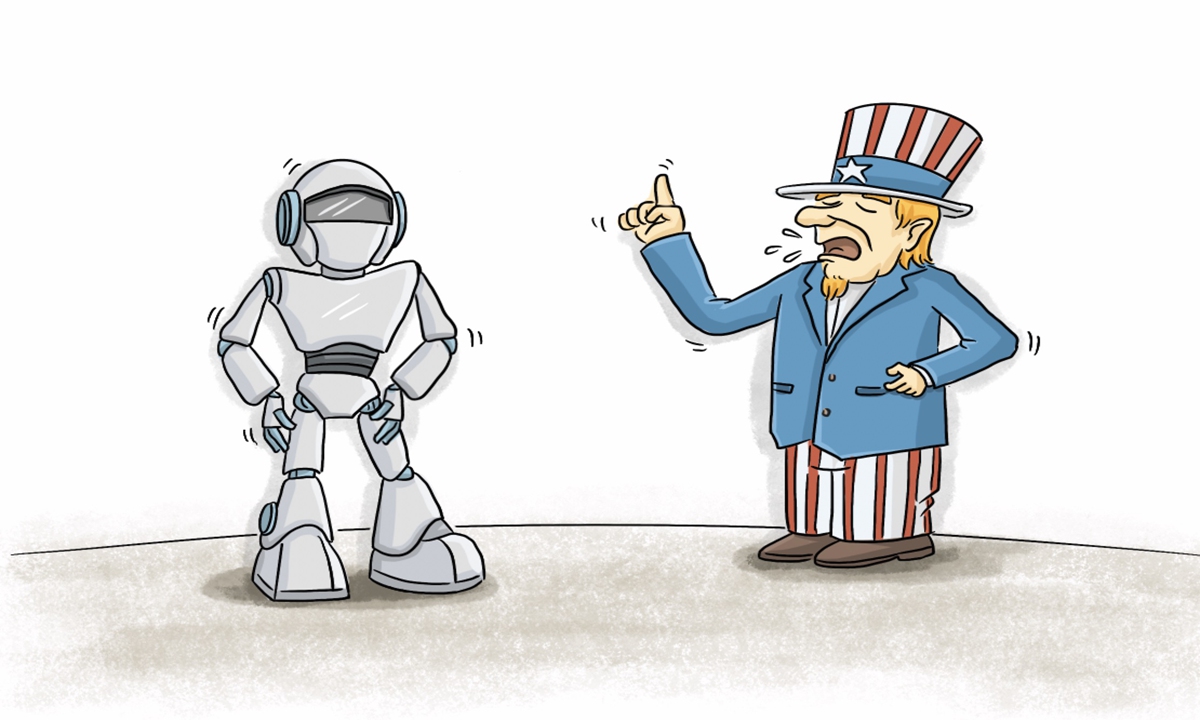COMMENTS / EXPERT ASSESSMENT
AI contest hype will only create barrier to industry cooperation

Illustration: Xia Qing/Global Times
The Pentagon's former chief software officer Nicolas Chaillan said that the US has already lost artificial intelligence (AI) competition to China. In an interview with the Financial Times shortly after his resignation, Chaillan said there was "good reason to be angry," because "the US has no competing fighting chance against China in 15 to 20 years."The first chief software officer for the US Air Force, who spent three years on a Pentagon-wide effort to boost cyber security, told American media that he plans to testify to the US Congress about the Chinese cyber threat to US supremacy.
There is no doubt that the US takes a leading position in the AI field, where China is catching up rapidly. The advantages of the US can be reflected in some high-end and core innovations of AI. China has achieved an advanced position in applications such as speech recognition. The number of patents in China, the scale of investment and the growth of the industry, are also growing at a speed exceeding many people's expectations.
As for whether China has surpassed the US in AI, it is believed that the international scientific communities should be able to offer an objective conclusion after doing their evaluation. However, it should be pointed out that although China is ratcheting up investment on AI and other technologies, its purpose is not to surpass any specific country.
No matter how accurate the ex-Pentagon software chief's assessment is, overly hyping an "AI contest" will only add up barriers between the two countries' technological cooperation. Taking such a view full of pathologically competitive mentality is also likely to intensify US' hostility against China, and may push more US tech companies to abandon mutually beneficial cooperation with Chinese companies.
The rapid development of a country's science and technology is inseparable from open cooperation and exchanges with global partners, but the US has not been able to rationally view the rise of China's science and technology levels. The US government has long been doing its utmost to stifle Chinese technology companies and contain China's technological development.
For instance, the previous Trump administration launched a relentless attack against Chinese 5G giant Huawei. Washington imposed a strict sales ban on Huawei, while lobbying its allies to exclude Huawei from their 5G construction plans. The Biden administration has kept on such suppression. The Wall Street Journal blatantly claimed in an article on Monday that "Washington's campaign has used some of the most destructive tools in its arsenal, and they have succeeded."
On the technology front, Biden has intensified the contest, namely by blocking the US from sharing leading technology with Chinese companies. The Biden administration in March reportedly amended licensing arrangements for companies to sell to Huawei, further restricting companies from supplying items that can be used to produce Huawei's 5G devices. The White House's chip summit in April with many multinational companies excluded all key players from the Chinese mainland.
Instead of strangling China's technology development, the US' decoupling approach has disrupted the global research and development of science and technology, while slowing down the pace of technological progress in the US too. The reasons for the current global chip supply shortage are complex, but one of the most important artificial factors is the so-called decoupling measures taken by the US.
When asked about economic "decoupling" from China, Biden's trade representative Katherine Tai last week said it was not realistic for the world's two largest economies to stop trading with each other. Tai said the US is looking for a kind of "recoupling." It is hoped that the US can readjust its science and technology policy, and engage in conscientious competition and cooperation with China, instead of continuing to harm others and disadvantage itself.
The author is a veteran telecommunications industry analyst. bizopinion@globaltimes.com.cn
